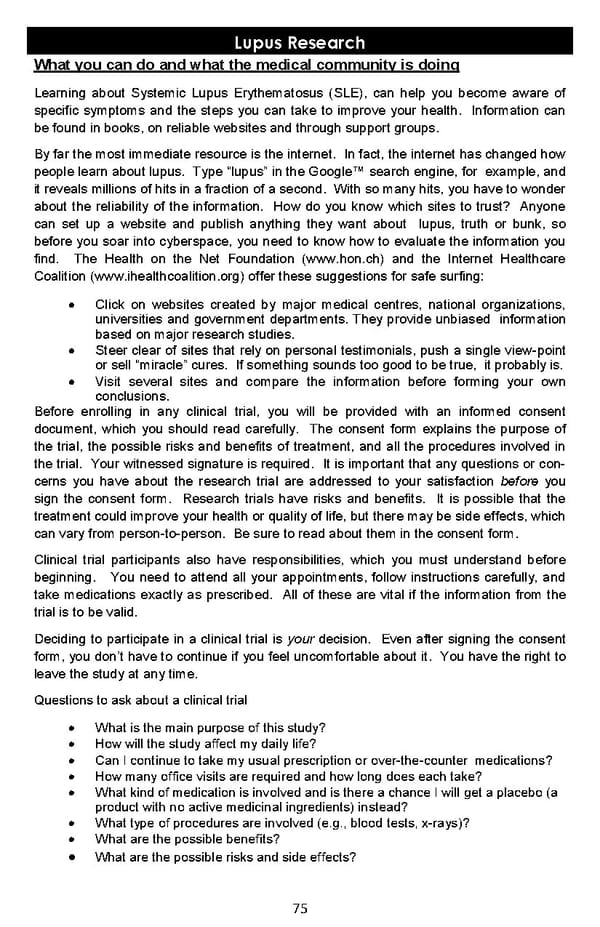Lupus Research What you can do and what the medical community is doing Learning about Systemic Lupus Erythematosus (SLE), can help you become aware of specific symptoms and the steps you can take to improve your health. Information can be found in books, on reliable websites and through support groups. By far the most immediate resource is the internet. In fact, the internet has changed how people learn about lupus. Type “lupus” in the Google™ search engine, for example, and it reveals millions of hits in a fraction of a second. With so many hits, you have to wonder about the reliability of the information. How do you know which sites to trust? Anyone can set up a website and publish anything they want about lupus, truth or bunk, so before you soar into cyberspace, you need to know how to evaluate the information you find. The Health on the Net Foundation (www.hon.ch) and the Internet Healthcare Coalition (www.ihealthcoalition.org) offer these suggestions for safe surfing: • Click on websites created by major medical centres, national organizations, universities and government departments. They provide unbiased information based on major research studies. • Steer clear of sites that rely on personal testimonials, push a single view-point or sell “miracle” cures. If something sounds too good to be true, it probably is. • Visit several sites and compare the information before forming your own conclusions. Before enrolling in any clinical trial, you will be provided with an informed consent document, which you should read carefully. The consent form explains the purpose of the trial, the possible risks and benefits of treatment, and all the procedures involved in the trial. Your witnessed signature is required. It is important that any questions or con- cerns you have about the research trial are addressed to your satisfaction before you sign the consent form. Research trials have risks and benefits. It is possible that the treatment could improve your health or quality of life, but there may be side effects, which can vary from person-to-person. Be sure to read about them in the consent form. Clinical trial participants also have responsibilities, which you must understand before beginning. You need to attend all your appointments, follow instructions carefully, and take medications exactly as prescribed. All of these are vital if the information from the trial is to be valid. Deciding to participate in a clinical trial is your decision. Even after signing the consent form, you don’t have to continue if you feel uncomfortable about it. You have the right to leave the study at any time. Questions to ask about a clinical trial • What is the main purpose of this study? • How will the study affect my daily life? • Can I continue to take my usual prescription or over-the-counter medications? • How many office visits are required and how long does each take? • What kind of medication is involved and is there a chance I will get a placebo (a product with no active medicinal ingredients) instead? • What type of procedures are involved (e.g., blood tests, x-rays)? • What are the possible benefits? • What are the possible risks and side effects? 75
 Living Well With Lupus Facts Booklet Page 74 Page 76
Living Well With Lupus Facts Booklet Page 74 Page 76